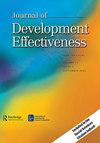Determining success factors for improving rural livelihood strategies: how can participatory social network mapping help?
IF 0.5
4区 经济学
Q4 DEVELOPMENT STUDIES
引用次数: 6
Abstract
ABSTRACT The integration of upgrading strategies (UPS) as part of the livelihood strategies of small farmers is vital for enhancing their food systems. The success of the UPS implementation largely relies on the interactions among key actors. Understanding the complex social realities of farmers is essential for adapting strategies to the local context. Therefore, the objective of this study is to determine the impact of UPS on the livelihood of participants in two case study areas in Tanzania. We used a mixed-method approach to understand the relations between, roles, and motivations of relevant actors in the participatory implementation of their UPS using the Net-Map tool for social network analysis and focus group discussions. Our results reveal why the implementation of UPS improved people´s livelihoods and allowed us to derive some success factors. Motivations for participating in a UPS group differed to some extent among all UPS groups and all types of actors. Based on our results, we found that UPS allow participants to enhance their social networks within their communities and develop skills that improve their livelihood strategies, resulting in more diverse livelihood outcomes. This research provides a knowledge base for UPS considerations and other participatory actions with local subsistence stakeholders.确定改善农村生计策略的成功因素:参与式社会网络地图如何提供帮助?
整合升级战略(UPS)作为小农生计战略的一部分,对于加强其粮食系统至关重要。UPS的成功实施在很大程度上依赖于关键参与者之间的相互作用。了解农民复杂的社会现实对于使战略适应当地情况至关重要。因此,本研究的目的是确定UPS对坦桑尼亚两个案例研究区域参与者生计的影响。我们使用混合方法来了解参与实施UPS的相关参与者之间的关系、角色和动机,使用Net-Map工具进行社会网络分析和焦点小组讨论。我们的研究结果揭示了为什么UPS的实施改善了人们的生活,并使我们能够得出一些成功因素。参与UPS小组的动机在所有UPS小组和所有类型的参与者之间都有一定程度的差异。根据我们的研究结果,我们发现UPS允许参与者加强他们在社区内的社交网络,并发展改善其生计策略的技能,从而产生更多样化的生计结果。本研究为UPS考虑和其他与当地生存利益相关者的参与性行动提供了知识基础。
本文章由计算机程序翻译,如有差异,请以英文原文为准。
求助全文
约1分钟内获得全文
求助全文

 求助内容:
求助内容: 应助结果提醒方式:
应助结果提醒方式:


